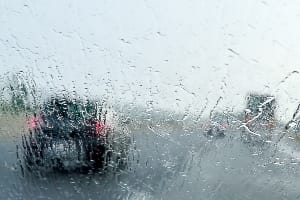Sudden heavy rain during your daily commute could lead to a dangerous car crash, especially if your windshield wipers are defective. If your windshield wipers are not functioning properly, it can be difficult for you to see the road ahead of you, increasing your risk of a crash.
Table of Contents
If you were injured due to defective windshield wipers, our knowledgeable Harrisburg car accident lawyers can help. We offer a free consultation where you can discuss your situation, get answers to your questions and learn if you may have legal options.
Call us today to request your free case evaluation today: 717-727-2500.
When Defective Wipers Turn Rain Into Danger

When windshield wipers stop working in the rain, it creates a serious safety issue. Drivers depend on their wipers to ensure clear visibility. Even a moment of impaired vision increases the risk of an accident. For example, if the wipers leave streaking across the primary area of vision, drivers may be unable to see a vehicle switching into their lane.
Some common wiper defects that can lead to crashes include:
- Sudden motor failure while the wipers are in use
- Blades detaching from the wiper arms at high speeds
- Substandard rubber that splits and causes streaks
- Wiper arms that freeze or stick during operation
- Electrical issues that prevent wipers from functioning
- Missing or damaged components that deliver wiper fluid
- Loose or broken pivot joint
Liability for Windshield Wipers and Rain Accidents
When defective wipers lead to an accident, several parties might share responsibility. Understanding who may be at fault can help victims seek the compensation they deserve for their injuries.
Vehicle Manufacturers
Auto manufacturers are required to ensure that all safety features, including wiper systems, comply with federal standards. They are responsible for any design flaws, manufacturing defects or lapses in quality control that allow unsafe products to reach the market.
When manufacturers discover defects, they must promptly issue recalls and notify vehicle owners about potential safety risks. Failure to do so increases their liability for accidents.
Parts Manufacturers
Companies that produce windshield wiper components can be held liable if their products fail due to poor materials, improper assembly or failure to meet safety specifications. This liability extends to wiper motors, arms, blades and electrical components manufacturers.
To prevent failures, manufacturers should provide clear installation and maintenance guidelines. They must also conduct rigorous quality testing and report any defects discovered after distribution.
Service Providers
Repair shops and dealerships can also bear responsibility if they fail to properly install, maintain or inspect wiper systems. Negligence in these areas can contribute to system failures. Examples of negligence include:
- Installing incorrect wiper components
- Failing to secure wiper assemblies properly
- Overlooking apparent signs of wear during inspections
- Making unauthorized modifications
- Using substandard replacement parts
- Skipping required maintenance steps
- Failing to test wipers after installation
- Ignoring manufacturer maintenance schedules
- Installing mismatched wiper blades
- Not checking electrical connections
Driver
Drivers are responsible for maintaining their vehicles, so if a driver knew or should have known their wipers were defective and failed to replace them, they could be liable for the crash.
How to Properly Document Wiper Failure After a Car Accident
Thorough documentation helps establish a strong link between defective wipers and crash damages. Evidence can fade or disappear quickly after an accident, so seeking legal help immediately is crucial.
Here are some important steps to follow:
- Take photographs of the scene, capture the weather conditions and the damages
- Record videos showing any visible wiper malfunctions
- Save weather reports and rainfall data
- Request traffic camera footage if it is available
- Document all wiper repairs and replacements
- Keep maintenance records and repair invoices
- Collect witness statements
- Report the incident to your insurance company
- File a complaint with the vehicle manufacturer
- Preserve broken windshield wiper parts
- Get a police report documenting weather conditions.
- Save all communication with repair shops.
- Track and document all accident-related expenses
Contact a Harrisburg Car Accident Attorney
Our legal team at Schmidt Kramer has been fierce advocates for the injured for many years. We have a proven history of success, and we are ready to help you too.
There is no need to deal with the aftermath of a car accident alone. We are here to support you throughout the legal process, fighting for the fair compensation you deserve. There are no upfront costs to pay when you hire our services. Our attorneys do not get paid unless you do.
Need legal assistance? Call Schmidt Kramer today: 717-727-2500.

